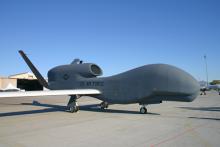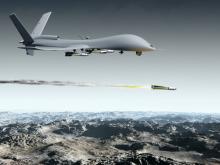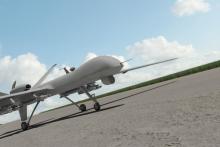drones

Bio: Sister Jean Lait, CSF, is an Anglican Franciscan sister based in San Francisco who protests drones and their effects on children. communitystfrancis.org
1. Why did you decide to stand up against drones?
During WWII, I experienced the bombing of Coventry in England. As a child of 9 years, I slept under the stairs, anxiously waiting for the bombs to drop. Toward the end of the war, flying bombs known as “doodlebugs” were used. These were very similar to drones and were sent from Germany. They were aimed anywhere. These were bombs where you heard a whistle and then it was silent before the bang.
Thinking back on the fear and anxiety I experienced, the whole idea of drone warfare is just immoral to me. No child should ever be that frightened. No child should have to live in a war zone. That kind of trauma affects you, one way or another. You either use that experience for good or otherwise.

AS THE U.S. prepares to officially (but not completely) pull out its military from Afghanistan by the end of 2014, some wonder whether it all was a waste. More than a decade of war has cost tens of thousands of lives and hundreds of billions of dollars. But the balance sheet of “lessons learned” shows some less-depressing calculations.
In the last several years, U.S. generals have repeatedly told Congress and the U.S. public that “there is no military solution” to the war in Afghanistan. This marks a significant shift in military thinking. In the early 2000s, the boastful, overconfident views that wars in Afghanistan and Iraq would be quick and easy outnumbered more cautious and skeptical military voices. If nothing else, more military leaders today are forthrightly speaking out against the fantasy of firepower solutions to complex political problems.
The U.S. and its Western allies are also learning a related lesson: The lack of legitimate governance is a fundamental cause of much of the world’s violence. Afghanistan’s political leaders who opposed the Taliban became de facto Western allies, even though many had ruled by force and racked up their own long list of human rights abuses. In the rush to set up a new government to replace the Taliban, the West propped up corrupt and tyrannical warlords as provincial governors, dooming hopes for an Afghan democracy and authentic leaders with popular support.
Counterinsurgency projects attempted to pull support from the Taliban and other insurgents by winning Afghan hearts and minds so they would trust their government. But Western military forces learned that free handouts of Western aid money could not fundamentally change the corrupt nature of the Afghan government or its public image.

For centuries, followers of Jesus have wondered how they should relate to states and governments. Recent documents from Amnesty International, Human Rights Watch, and the United Nations bring such concerns to the fore, highlighting the cruel collateral damage of many of President Barack Obama’s personally ordered drone strikes — strikes that according to the president, are legal and in accord with international law, use technology that is precise and limit unnecessary casualties, eliminate people that are real threats, and prevent greater violence.
Rather than considering the humanity of our (perceived) enemies and seeking reconciliation and restorative justice, we default to catching and killing. In doing so, we give the widest berth possible to Jesus's teachings and examples of self-sacrificial enemy love. In both Matthew 5 and Luke 6, Jesus tells us that to love our enemies is to be children of God, for radical love and kindness are his nature and his perfection. Loving enemies is essential to anyone who would claim God as his or her Father. Jesus said, "Love." Not, "Love unless you happen to be the ones in charge and in possession of firepower. In that case, kill the bastards."
We are charged with loving our world indiscriminately, self-sacrificially, and with great humility, and that should always inform our relationship with the state and government.

Is the U.S. scapegoating Al Qaeda? It’s an odd question, I know, but it reared its ugly head as I read about the new reports from Amnesty International and Humans Rights Watch on U.S. drone strikes. The scapegoating mechanism is a very precise instrument that accrues enormous benefits to the scapegoater. By accusing their scapegoat of wrongdoing, a scapegoater ingeniously hides from the reality of their own guilt. Now here’s the weird thing: a scapegoat does not have to be innocent to function as a scapegoat. Scapegoats can be evil, nasty, ruthless, amoral sons-of-bitches and still function perfectly well as a scapegoat. Which is why I ask the question: Is the U.S. scapegoating Al Qaeda to hide from its own guilt?
With that in mind, I invite you to read these few excerpts that raised the question for me, with key phrases in boldface:
[continued at jump]

IN EARLY SEPTEMBER, President Obama told the American people that the use of chemical weapons by Bashar al-Assad of Syria was a moral atrocity that required international consequences.
Religious leaders agree with the necessity of a determined response to the Assad regime, which is responsible for the deaths of 100,000 of his own people, including the brutal use of chemical weapons on civilians. But many faith leaders are asking tough moral questions about what that response should look like.
We fundamentally reject the assumption that refraining from military action is “doing nothing.” We need more imagination and a deeper response than the traditional one of military strikes, which haven’t proven effective and almost always have serious unintended consequences, risk dangerous escalations, and consistently create more suffering for innocent civilians.
As religious leaders, we are called to peacemaking, not just peace loving, which requires harder and more imaginative work than merely falling into old habits of military “solutions.” Our priorities should be to mobilize global support for the many vulnerable Syrians—including the millions of refugees—and to do the hard work of conflict resolution that could lead to a political solution.
As Ramzi Kysia writes in "The Song Remains" (Sojourners, August 2013), after decades of work, Kathy Kelly’s commitment to peace and nonviolence remains strong. When Sojourners editorial assistant, Dawn Araujo, caught up with her in June, Kelly was between visits to Afghanistan and her work with the Afghan Peace Volunteers. She was spending her “down” time protesting drones, nuclear weapons, and organizing a U.S.
In response to criticism, the U.S. has drastically reduced the number of drone strikes in Pakistan and is limiting them to “high-value targets.” The Associated Press reports:
The CIA has been instructed to be more cautious with its attacks, limiting them to high-value targets and dropping the practice of so-called "signature strikes" - hitting larger groups of suspected militants based purely on their behavior, such as being armed and meeting with known militants, said a current U.S. intelligence official and a former intelligence official briefed on the drone program. …
Two other senior American officials said the U.S. scaled back the number of attacks and tightened up its targeting criteria as a concession to the Pakistani army, considered the most powerful institution in the country and the final arbiter on the future of the drone program.
Read more here.
The ACLU and the Center for Constitutional Rights have sued former Pentagon officials over the drone strikes that killed three U.S. citizens in Yemen. At a hearing in federal court on Friday, an Obama administration lawyer argued that courts should stay out of national security decision making. McClatchy News reports Judge Rosemary M. Collyer wasn’t so sure:
A Republican-appointed judge sounded dubious about the expansive claim, saying she was “really troubled” by assertions that courts are completely shut out of the drone strike debate. But for other legal reasons, the judge also sounded hesitant about a lawsuit targeted at top military and intelligence officials for violating the constitutional rights of U.S. citizens blown up in foreign lands.
Read more here.
In the past few months, drone attacks in Afghanistan, Pakistan, and Yemen have dwindled to only a few. But the use of drones for unarmed surveillance has dramatically grown, giving the U.S. military unprecedented capabilities to track activities around the world. The Washington Post reports:
Over the past decade, the Pentagon has amassed more than 400 Predators, Reapers, Hunters, Gray Eagles and other high-altitude drones that have revolutionized counterterrorism operations. Some of the unmanned aircraft will return home with U.S. troops when they leave Afghanistan. But many of the drones will redeploy to fresh frontiers, where they will spy on a melange of armed groups, drug runners, pirates and other targets that worry U.S. officials.
Read more here.

Dear Liberty University,
I want to write truthfully about God. I know many will find that an odd way to begin a letter about U.S. drone warfare, but I see no other way. This morning, I was discouraged to read that Liberty University has been training Christians to pilot armed U.S. drones since 2011 in your School of Aeronautics (SOA). The reasons for my discouragement are many — not least of which is the idea that Liberty graduates can somehow "serve the Lord" by targeting and killing their neighbors. Here, I would like to outline some of my concerns in detail with the hope that Liberty might reconsider, or at least restate theologically, its position regarding U.S. drone warfare.

Early Wednesday morning, at least 17 people were killed in the first U.S. drone attack in Pakistan since May 28.
According to NBC News:
“PESHAWAR, Pakistan -- At least 17 people were killed in a U.S drone attack in the volatile North Waziristan tribal region in northwest Pakistan early Wednesday, officials said.
"Local residents and security officials said the aircraft fired four missiles and struck a house at Sara-e-Darpakhel area of Miranshah, which is located near the Afghan border.
"'I never heard such a huge drone strike before,' local resident Nasrullah Khan said. 'They simultaneously fired four huge missiles and jolted the entire town.'"
Al Jazeera reported that the Pakistan foreign ministry condemned the attack:
“In a press release on Wednesday, the Pakistan foreign ministry said the strikes were a violation of Pakistan’s sovereignty and territorial integrity. The statement described the attacks as 'counterproductive, entail loss of innocent civilian lives and have human rights and humanitarian implications.'"

Nine foreign climbers in the Himalayas in a remote part of northern Pakistan were killed Saturday night by a unit of the Pakistani Taliban. A Taliban spokesman claimed the killings were by a new unit set up to send a message against drone strikes by attacking foreigners. Al Jazeera reported:
“Taliban spokesman Ehsanullah Ehsan telephoned the AFP news agency to say that the killings were intended to avenge the death of the second in command of the Tehreek-e-Taliban (TTP) in a US drone strike late last month.
"We did it and we claim responsibility for this attack," Ehsan said in the call from an undisclosed location.
"One of our factions, Junood ul-Hifsa, did it. It is to avenge the killing of Maulvi Wali ur-Rehman," he said.
"We want to convey to the world that this is our reply to US drone attacks," he added.”
Read more here.

Dozens of peace activists walked into Des Moines, Iowa, yesterday, following a nearly 200-mile march from Rock Island, Ill. The march ended with a rally at the gate of the Iowa Air National Guard's 132nd Fighter Wing, where drone pilots will soon be trained. The Des Moines Register reported:
“Dozens of protesters walked during each leg of the march, which was organized by the Chicago-based Voices for Creative Nonviolence. The group covered about 15 miles a day, camping and staying in host houses along the way.
“Organizers said the march was also to protest the development of drone technology at the Quad Cities Manufacturing Lab in Rock Island. According to a company brochure, the lab manufactures UAV, or unmanned aerial vehicle, engine components.”
Read more here.

The most recent reported drone strike in Yemen, said to be five missiles fired at an SUV, killed at least six people. Reports from local tribal leaders in Yemen say that five were suspected Al Qaeda members, including a local leader. But one of those killed was a 10-year-old boy, brother of the AQ leader. Adam Baron of McClatchy News reports from Yemen:
“If an apparent U.S. drone strike this month in the village of Mahashama had killed only its intended targets – an al Qaida chief and some of his men – locals might’ve grumbled about a violation of Yemen’s national sovereignty and gone on with their lives.
“But the strike also killed a 10-year-old named Abdulaziz, the younger brother of the targeted militant, Saleh Hassan Huraydan, according to local tribal leaders and Yemenis with close ties to the al Qaida branch here. And that set off a firestorm of complaints that underscores how American airstrikes can so outrage a community that even though al Qaida loses some foot soldiers, it gains dozens of sympathizers.
“Killing al Qaida is one thing, but the death of an innocent person is a crime that we cannot accept,” said a sheikh from the area…”
Read more here.

In a Senate Judiciary Committee hearing Wednesday, FBI Director Robert Mueller admitted that drones are used for some law enforcement missions in the U.S. Today, the Washington Post reported that there have been at least four such operations since 2010. According to the Post:
“The FBI has received clearance from federal aviation officials to conduct drone surveillance operations in the United States on at least four occasions since 2010, according to public records and U.S. officials.
“The FBI began seeking permission in 2009 from the Federal Aviation Administration to fly drones domestically and received authorization for its first operations a year later, according to documents released Thursday by the FAA. The documents provide virtually no detail on where the FBI has operated drones in U.S. airspace, for what purpose or how long the missions lasted.”
Read more here.

Days before President Barack Obama's high-profile speech on drones and U.S. counterterrorism efforts, Sojourners sat down with investigative reporter Jeremy Scahill to take an inside look at U.S.-led covert wars and the drones that have become an integral part of our global “war on terror.”
His thesis?
"After years of traveling in these countries, I really believe that we’re creating more enemies than we’re killing.”
In some respects, drones are simply a new tool of old empire. Scahill, author of Dirty Wars: The World is a Battlefield and producer of the documentary of the same name, now in theaters, calls this an "unending war ... being legitimized under a popular Democratic president, who is a constitutional lawyer by trade.”
Indeed, within five years, the Bush administration's invasion of Iraq for terrorist attacks the country did not commit has transformed under the Obama administration into pre-emptive assassinations halfway around the world, for crimes citizens have not yet committed. The result, Scahill suggested, is our collective complicity to “unending war.”

A fundamental principle [of ancient Greek tragedy], often overlooked, is that the double and the monster are one and the same being.
- René Girard, Violence and the Sacred (p. 160)
The debate about the use of drone strikes in the so-called “War on Terror ” has shed light on an inevitable calculus of war: how many civilian casualties can be tolerated in pursuit of our goals? President Barack Obama, in his speech on May 23 at National Defense University, referred to the drone strikes in Pakistan, Yemen, and Somalia, admitting, “It is a hard fact that U.S. strikes have resulted in civilian casualties, a risk that exists in all war.” But of course, our wars and our use of drones were conceived as a legitimate response to the civilian deaths on 9/11 and a defensive maneuver to prevent future attacks.
Obama Defends Drone Attacks
In his speech, Obama further justified the use of drones by stating it reduces the number of civilian casualties compared to boots-on-the-ground wars. Though the numbers are hard to determine, it has been reported by the Canadian Broadcasting Corporation that civilian casualties caused by our invasion of Iraq number somewhere between 55,000 and 60,000. In Afghanistan, from the time reporting began in 2007, the Guardian reports that the total number of civilians who have lost their lives in the armed conflict to be 14,728. For drone strikes, the highest estimates put total civilian deaths at around 950, indisputably a better number.
The Illogical Logic of Violence
Reducing the number of deaths caused by our use of violence is a worthy goal, and Obama does seem genuinely engaged in drawing the number down. So for the sake of argument, I will take him at his word. But (you knew there was a but coming!), he is trapped, as so many of us are, within the logic of violence.

At first I had no problem with domestic drones joining the plethora of surveillance cameras to “keep us safe.”
Big Brother — keeping his eye on me from above in stores, in traffic and everywhere else — would find my personal reality show boring. As a pastor, I’m used to living in a fishbowl. Besides, as John Calvin said, if you fear the eye of a human more than the eye of God, you have spiritual issues to address.
But then, there may be another problem with increased surveillance and flooding our nation’s skies with drones. Let’s take traffic cameras as an example.

The pace of U.S. drone strikes is dramatically slowing. During the month of May, there was one strike in Pakistan and one in Yemen. The new restrictions announced by President Obama in his May 23 speech may be having an effect.
So on a Friday afternoon, here’s some good news on the drone front. In the U.K., Domino’s Pizza released a video of an experimental "DomiCopter" remote-controlled drone delivering two pizzas. Huffington Post reports:
We're crossing our fingers that Domino's new "DomiCopter" -- a drone that delivers pizzas -- is real. In a recent test video, the contraption traveled about four miles in 10 minutes on a two-pizza delivery in the U.K.
Domino's hired creative agency T + Biscuits to develop and test out the contraption. Founder Tom Hatton told NBC that so far, the DomiCopter has been a success. "If anything it went quicker than a pizza boy," he said, pointing out that the DomiCopter doesn't need to stop at red lights. "We were amazed at how easy it was going to be."